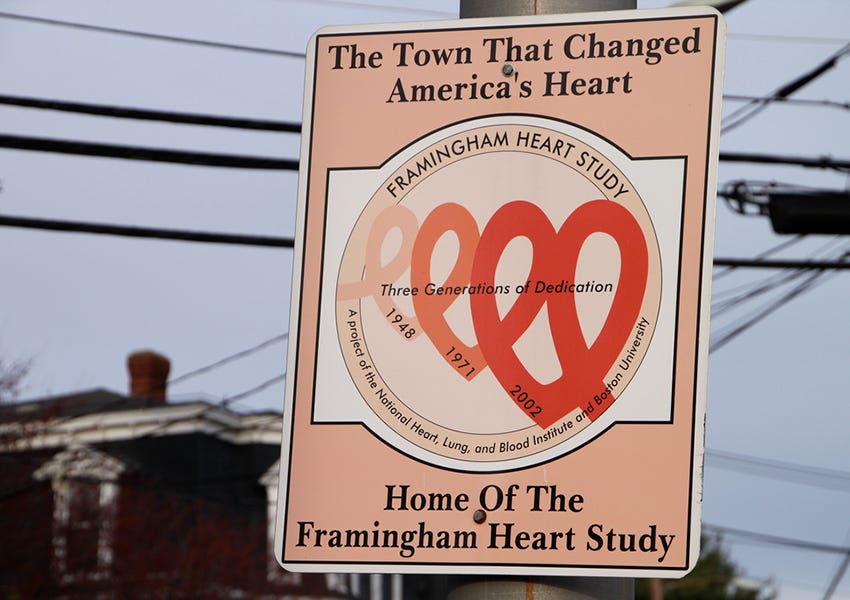(h/t to The Atlantic, Culture Study, and Bloomberg for recent articles on this topic)
I went down a bit of a rabbit-hole this week on one of the underlying premises behind this Substack: Does living near (or with) friends or family actually improve your happiness?
To answer this, we need to understand one of the most thorough and remarkable studies ever done - The Framingham Heart Study.
The town of Framingham is one of the most studied places on earth.
The inhabitants have been under a continual microscope from scientists since 1948 spanning the lives of 3 generations. The data collected from this long-ranging study has produced over 3000 scientific papers.
Originally the study was conceived to study heart health, but the amount of data allows scientists to look at other areas of interest.
And one Harvard scientist decided to look at the question of what factors most decisively led to the happiness of the residents [summary here].
The findings: Nearby friends make you happy, the closer the better
It turns out that living near friends or family is a huge boon to your happiness (provided your friend is also happy). And distance really matters. There is a huge difference between living 2 miles away and ½ a mile away.
A friend who lives within a mile (about 1.6 km) and who becomes happy increases the probability that you are happy by 25%
Within ½ a mile, this number is over 40%.
This aligns with something we’ve found at Radish. We now have over a dozen people who have moved walking distance away. We call them Radellites.
What we’ve noticed is that the Radellites behave very differently if they are a 5 minute vs 15 minute walk away. The 5-minute ones pop by unprompted. The 15-minute ones visit a lot, but it’s a bit more scheduled.
Friction matters, and 15 minutes is an outing. You have to worry about proper footwear and whether someone’s going to be home. 5-minute is a spur-of-the-moment thing. More like a walk between meetings.
Friends and emotional contagion
The authors propose an explanation about why having (happy) friends nearby makes you happy.
Emotional states can be transferred directly from one individual to another by mimicry and “emotional contagion” … people can “catch” emotional states they observe in others…
Happiness, in other words, is not merely a function of individual experience or individual choice but is also a property of groups of people. Indeed, changes in individual happiness can ripple through social networks and generate large scale structure in the network, giving rise to clusters of happy and unhappy individuals
We are social creatures taking social cues from others. Choosing the others you surround yourself with is one of the prime drivers of your emotional state.
Interesting tidbit: Gender matters, it seems
From the authors
Sex also plays a part in the spread of happiness. Happiness spreads significantly more through same sex relationships than opposite sex relationships (P=0.02, see appendix on bmj.com), possibly helping to explain why friends and next door neighbours might exhibit stronger effects than spouses (who in our sample were all opposite sex). This result also accords with previous evidence on sex effects in the spread of obesity and suggests that people might be more likely to take emotional cues from members of the same sex.
____
Other research:
A few other studies I found interesting:
The frequency of face-to-face encounters starts to decline once the distance between friends or relatives reaches five miles.
(For older adults): Living with family makes you happier than living alone
People with stronger social relationships live longer
EXTRA: Supernuclear has an exciting announcement next week….
Stay tuned….







Ugh I so wish I could live near all my friends. Just hard to at this age, everyone is flying around, travelling every where, getting married, etc.
this is fascinating: "Choosing the others you surround yourself with is one of the prime drivers of your emotional state."
a question arised while reading: how do we define a friend exactly? and then I wondered: depending on that definition, these results might be kinda depressive for many people; realising the perceived near-impossible task to gather / setup with their existing 'friends' in a 5-min walk radius.
which lead me to: but what if we (collectively) become better at turning our existing neighbors into friends?